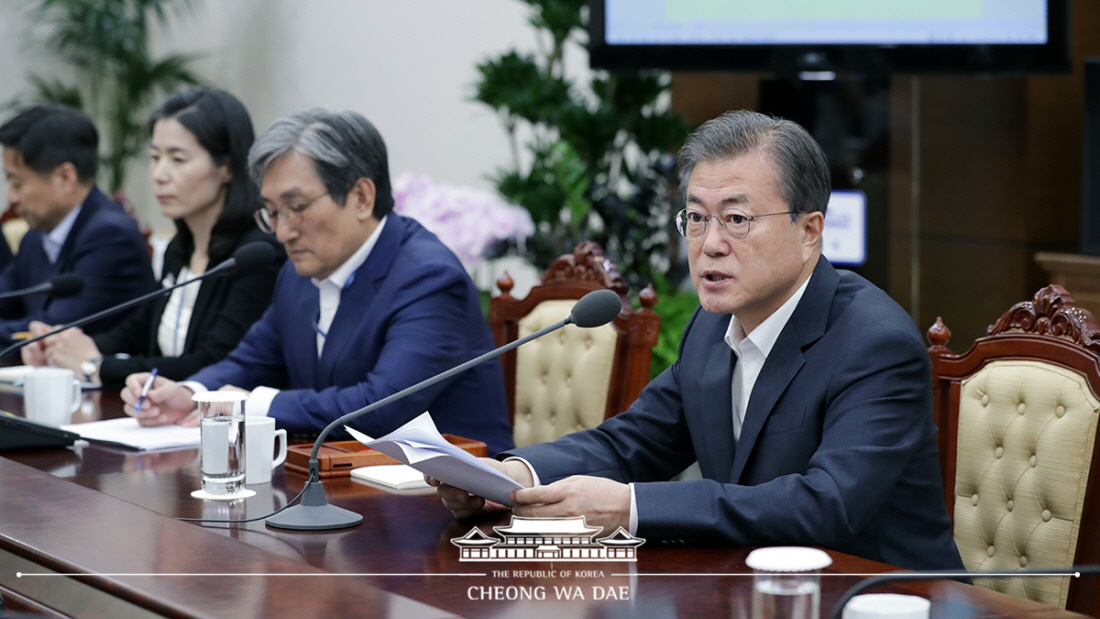이 웹사이트는 제19대 대통령 임기 종료에 따라 대통령기록관이 「대통령기록물 관리에 관한 법률」에 의해 이관받아 서비스하는 대통령기록물입니다. 자료의 열람만 가능하며 수정 · 추가 · 삭제는 불가능합니다.
다만, 「개인정보보호법」에 의하여 개인의 정보를 보호받기 원하시는 분은 관련 내용(요청자, 요청내용, 연락처, 글위치)을 대통령 웹기록물 담당자(044-211-2253)에게 요청해 주시면 신속히 검토하여 조치해 드리겠습니다. 감사합니다.
SPEECHES & REMARKS
BRIEFINGS

Uncertainty in the global economy is increasing due to the larger-than-expected economic slowdown around the world, combined with protectionism and trade tensions. For this reason, Korea’s heavily trade-dependent economy is facing mounting difficulties. At times like these, we should respond in a calm and composed manner. Today, Moody’s, one of the most renowned international credit rating agencies, announced that it would maintain its sovereign credit rating for Korea at Aa2, two notches higher than that of China and Japan. The agency also affirmed its outlook on Korea’s rating as stable. This evaluation attests to the fact that Korea’s economy and financial fundamentals are solid to that degree. Recently, Korea has succeeded in issuing US$1.5 billion worth of foreign exchange equalization bonds at a record-low interest rate. This is also the result of foreign investors confirming our strong economic fundamentals.
Unduly fomenting a crisis and generating anxieties, as opposed to gathering wisdom to solve problems, might actually diminish business sentiment and do harm to our economy. We must take this point to heart. With confidence in the potential of our economy – something that’s globally recognized – we have to pool our strength and collectively overcome external challenges.
Korea’s manufacturing industry is the 6th largest in the world. The development of manufacturing was the principal force behind Korea’s economic growth. The future of the Korean economy also depends on the competitiveness of manufacturing.
As part of the efforts to maintain Korea’s standing as a manufacturing powerhouse, my Administration has announced our manufacturing renaissance strategy. Domestic manufacturing, though a late starter, has registered incredibly fast growth. Despite its impressive size, our manufacturing sector still relies considerably on foreign suppliers for key parts, materials and equipment, which constitute the mainstays of the sector. As a consequence, its value added is relatively low, and the sector remains vulnerable to external factors. The gist of the manufacturing renaissance strategy is to further sharpen the competitive edge of the parts, materials and equipment sectors, including domestic localization. Only when the core of the industry is strong will it be possible to surmount any difficulties.
My Administration will make fostering the parts, materials and equipment industries one of the top priorities concerning the nation’s economic policy and provide support for businesses by mobilizing all available resources with regard to budget and tax benefits. I hope, on their side, businesses will work to break away from industrial structures that are dependent on foreign suppliers by expanding technology development and investments as well as by pursuing mutually beneficial cooperation with domestic firms that make components and materials. It’s feared that Japan’s recent export restrictive measure could set back local businesses’ production, placing global supply chains under threat. Korea and the whole world are concerned over the move to restrict reciprocal transactions between private businesses for political purposes. What matters most in this unprecedented emergency is for the Government and business community to maintain close communication and work together.
Depending on how the situation changes, we need to consider a joint public-private emergency response system: Cheong Wa Dae, related ministries and agencies all have to listen directly to what respective businesses have to say concerning hardships caused by changing circumstances, discuss solutions with them and help in every way possible.
At the same time, the Government will make level-headed efforts to formulate diplomatic solutions. A vicious cycle of response and counter response would never be desirable for either country. However, if Korean businesses suffer actual harm, the Government will have no choice but to respond accordingly. I hope that this can be avoided.
I urge Japan to withdraw the measure and engage in sincere bilateral consultations. I’d like to see Japan return to the international consensus that trade should be used as a tool for achieving common prosperity and the principles of free trade that it has always advocated. Japan is an economic powerhouse far ahead of us in terms of economic strength. Only when the ruling and opposition parties and the people pool their strengths can the Government and businesses prevail over these difficulties. The Government will work meticulously with businesses to come up with short-term countermeasures and prescriptions to minimize damage to them. From the mid- to long-term perspective, we will take this as an opportunity to resolve structural problems that have accumulated in the Korean economy over the past several decades. Moreover, we will strive to improve the serious trade deficit by developing Korea-Japan trade relations in a more mutually beneficial and balanced manner.



